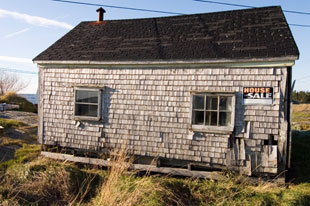Everyone s looking for a bargain these days and the Real Estate Market is obliging. Many homes that are currently on the market are Foreclosures or Short Sales. Unfortunately most of these homes are being sold with no disclosures, as is, Caveat Emptor (or a�?Buyer Bewarea�?) and usually need some work or are considered a�?fixer-uppersa�?.
You need to know the facts before you decide that this bargain is the right one for you. When you buy a fixer-upper house, you can save a ton of money, or get yourself in a financial mess (anyone out there remember the movie a�?The Money Pita�??).
Trying to decide whether to buy a fixer-upper house? Follow these seven steps, and youa��ll know how much you can afford, how much to offer, and whether a fixer-upper house is right for you.
1. Decide what you can do yourself.
TV remodeling shows make home improvement work look like a snap. In the real world, attempting a difficult remodeling job that you dona��t know how to do will take longer than you think and can lead to less-than-professional results that wona��t increase the value of your fixer-upper house.
- Do you really have the skills to do it? Some tasks, like stripping wallpaper and painting, are relatively easy. Others, like electrical work, can be dangerous when done by amateurs.
- Do you really have the time and desire to do it? Can you take time off work to renovate your fixer-upper house? If not, will you be stressed out by living in a work zone for months while you complete projects on the weekends?
2. Price the cost of repairs and remodeling before you make an offer.
- Get your contractor into the house to do a walk-through, so he can give you a written cost estimate on the tasks hea��s going to do.
- If youa��re doing the work yourself, price the supplies.
- Either way, tack on 10% to 20% to cover unforeseen problems that often arise with a fixer-upper house.
3. Check permit costs.
- Ask local officials if the work youa��re going to do requires a permit and how much that permit costs. Doing work without a permit may save money, but ita��ll cause problems when you resell your home.
- Decide if you want to get the permits yourself or have the contractor arrange for them. Getting permits can be time-consuming and frustrating. Inspectors may force you to do additional work, or change the way you want to do a project, before they give you the permit.
- Factor the time and aggravation of permits into your plans.
4. Double check pricing on structural work.
If your fixer-upper home needs major structural work, hire a structural engineer for $500 to $700 to inspect the home before you put in an offer so you can be confident youa��ve uncovered and conservatively budgeted for the full extent of the problems. Get written estimates for repairs before you commit to buying a home with structural issues. Dona��t purchase a home that needs major structural work unless:
- Youa��re getting it at a steep discount
- Youa��re sure youa��ve uncovered the extent of the problem
- You know the problem can be fixed
- You have a binding written estimate for the repairs
5. Check the cost of financing.
Be sure you have enough money for a down payment, closing costs, and repairs without draining your savings. If youa��re planning to fund the repairs with a home equity or home improvement loan:
- Get yourself pre-approved for both loans before you make an offer.
- Make the deal contingent on getting both the purchase money loan and the renovation money loan, so youa��re not forced to close the sale when you have no loan to fix the house.
- Consider the Federal Housing Administrationa��s Section 203(k) program, which lets qualified purchasers wrap up to $35,000 into their mortgages to upgrade their home before they move in.
6. Calculate your fair purchase offer.
Take the fair market value of the property (what it would be worth if it were in good condition and remodeled to current tastes) and subtract the upgrade and repair costs. For example: Your target fixer-upper house has a 1960s kitchen, metallic wallpaper, shag carpet, and high levels of radon in the basement. Your comparison house, in the same subdivision, sold last month for $200,000. That house had a newer kitchen, no wallpaper, was recently re-carpeted, and has a radon mitigation system in its basement. The cost to remodel the kitchen, remove the wallpaper, carpet the house, and put in a radon mitigation system is $40,000. Your bid for the house should be $160,000. Ask your real estate agent if ita��s a good idea to share your cost estimates with the sellers, to prove your offer is fair.
7. Include inspection contingencies in your offer.
Dona��t rely on your friends or your contractor to eyeball your fixer-upper house. Hire pros to do common inspections like:
cheap sinemet and
- Home inspection. This is key in a fixer-upper assessment. The home inspector will uncover hidden issues in need of replacement or repair. You may know you want to replace those 1970s kitchen cabinets, but the home inspector has a meter that will detect the water leak behind them.
- Radon, mold, lead-based paint
- Septic and well
- Pest Most home inspection contingencies let you go back to the sellers and ask them to do the repairs, or give you cash at closing to pay for the repairs. The seller can also opt to simply back out of the deal, as can you, if the inspection turns up something you dona��t want to deal with. If that happens, this isna��t the right fixer-upper house for you. Go back to the top of this list and start again.
cheap anacin pain
If youa��re in the market to buy or sell a home or facing a financial challenge and need to short sale your home, please give me a call at 832-5786-4902.
some information provided by: houselogic.com




Whether a “fixer upper” or new, your home is one of the most important investments you will ever make. Knowing the condition of the home is one of your most valuable tools. Budgeting, risk, management, etc. It is hard to believe that buyers want to skip this phase of the purchase.
Great list on a current topic. Thanks for sharing.
Dave Park
Advantage Home Inspection Raleigh